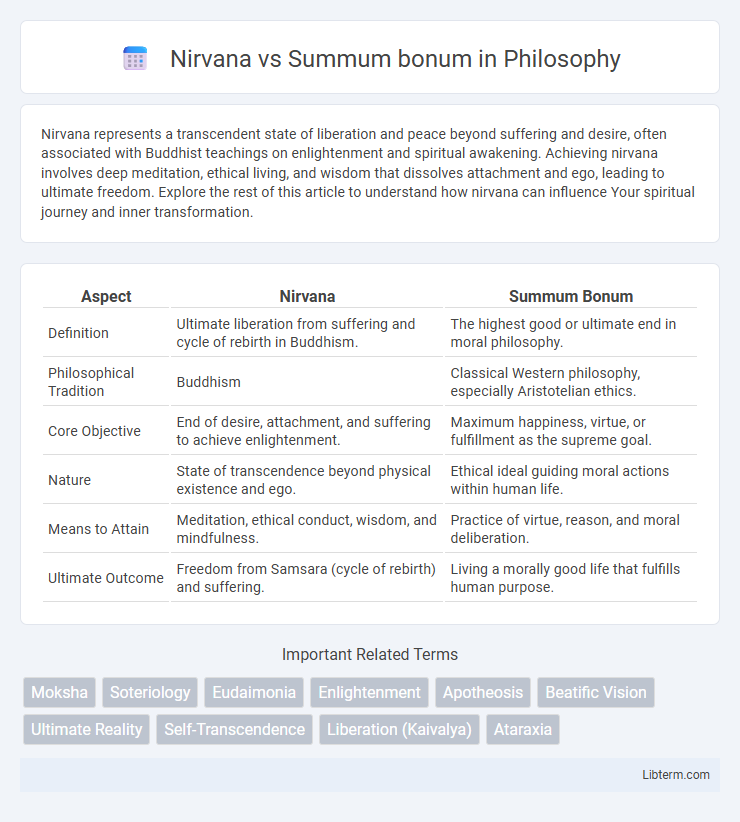Nirvana represents a transcendent state of liberation and peace beyond suffering and desire, often associated with Buddhist teachings on enlightenment and spiritual awakening. Achieving nirvana involves deep meditation, ethical living, and wisdom that dissolves attachment and ego, leading to ultimate freedom. Explore the rest of this article to understand how nirvana can influence Your spiritual journey and inner transformation.
Table of Comparison
| Aspect | Nirvana | Summum Bonum |
|---|---|---|
| Definition | Ultimate liberation from suffering and cycle of rebirth in Buddhism. | The highest good or ultimate end in moral philosophy. |
| Philosophical Tradition | Buddhism | Classical Western philosophy, especially Aristotelian ethics. |
| Core Objective | End of desire, attachment, and suffering to achieve enlightenment. | Maximum happiness, virtue, or fulfillment as the supreme goal. |
| Nature | State of transcendence beyond physical existence and ego. | Ethical ideal guiding moral actions within human life. |
| Means to Attain | Meditation, ethical conduct, wisdom, and mindfulness. | Practice of virtue, reason, and moral deliberation. |
| Ultimate Outcome | Freedom from Samsara (cycle of rebirth) and suffering. | Living a morally good life that fulfills human purpose. |
Defining Nirvana: Origins and Interpretations
Nirvana, originating from ancient Indian religions such as Buddhism, represents the ultimate liberation from the cycle of birth, death, and rebirth (samsara) through the extinguishing of desire and suffering. It is interpreted as a transcendent state of peace, freedom, and bliss, where the self's illusions dissolve, leading to enlightenment and spiritual awakening. Unlike Summum bonum, the highest good in Western philosophy describing ultimate morality or happiness, Nirvana emphasizes experiential cessation of suffering beyond conceptual ideals.
Summum Bonum: Tracing the “Highest Good”
Summum Bonum represents the philosophical concept of the "highest good," often characterized as the ultimate end or purpose that human life should aspire to achieve. In contrast to Nirvana, which in Buddhism signifies liberation from suffering and the cycle of rebirth, Summum Bonum encompasses a broader ethical ideal central to Western philosophy, particularly in Aristotelian and Kantian traditions. This notion traces its origins to classical antiquity and continues to influence contemporary debates on morality, happiness, and human flourishing.
Philosophical Foundations: East vs West
Nirvana in Eastern philosophy represents the ultimate liberation from suffering and the cycle of rebirth, grounded in Buddhist teachings emphasizing detachment and enlightenment. Summum bonum, central to Western philosophy, denotes the highest good or ultimate value, often linked to ethical frameworks like Aristotelian virtue ethics or Kantian moral law. This contrast reflects Eastern focus on transcendence and inner peace versus Western pursuit of moral perfection and rational fulfillment.
Key Teachings: Buddhism and Ethical Traditions
Nirvana in Buddhism represents the ultimate liberation from suffering and the cycle of rebirth, achieved through the Four Noble Truths and the Eightfold Path emphasizing ethical conduct, mental discipline, and wisdom. Summum bonum, a concept in ethical traditions, denotes the highest good or ultimate aim of moral philosophy, often associated with virtues and happiness as pursued by thinkers like Aristotle and Kant. While Nirvana centers on spiritual enlightenment and cessation of desire, summum bonum emphasizes the integration of ethical values and rational principles to attain moral perfection and human flourishing.
The Role of Desire: Letting Go vs Moral Aspiration
Nirvana emphasizes the cessation of desire as essential to ending suffering and achieving ultimate peace, advocating for detachment from worldly cravings. Summum bonum centers on the pursuit of moral excellence and the highest good, where desire fuels virtuous aspirations and ethical growth. The contrast highlights desire's dual role: surrender in Nirvana versus intentional cultivation in summum bonum.
Pathways to Attainment: Meditation and Ethical Action
Nirvana is attained through deep meditation, ethical conduct, and the Eightfold Path, emphasizing the cessation of suffering and liberation from the cycle of rebirth. Summum bonum, often interpreted as the highest good in philosophical ethics, is reached by cultivating virtues and moral excellence through intentional ethical action and reflective living. Both concepts highlight disciplined practices--meditative mindfulness in Nirvana and principled ethical behavior in summum bonum--as essential pathways to ultimate fulfillment and spiritual realization.
Universal vs Individual Salvation
Nirvana in Buddhism represents individual salvation through the cessation of suffering and the cycle of rebirth, emphasizing personal enlightenment as the ultimate goal. Summum bonum, a concept in Western philosophy meaning the "highest good," often implies a universal ethical ideal that benefits all humanity rather than focusing solely on individual liberation. The contrast highlights Nirvana's path of personal spiritual fulfillment versus Summum bonum's broader aspiration for collective moral and existential harmony.
Ultimate Fulfillment: Spiritual Emptiness or Perfect Good?
Nirvana represents ultimate fulfillment in Buddhism as the cessation of desire and the liberation from suffering, embodying spiritual emptiness that transcends worldly attachments. Summum bonum in Western philosophy signifies the highest good, an ideal of perfect moral and ethical goodness that provides ultimate purpose and fulfillment. The contrast lies in Nirvana's focus on emptiness and detachment as the path to fulfillment, while summum bonum emphasizes achieving ultimate good through virtuous living.
Influences on Modern Thought and Spirituality
Nirvana, rooted in Buddhist philosophy, emphasizes liberation from suffering through enlightenment and detachment from desires, profoundly shaping mindfulness and meditation practices in modern spirituality. Summum bonum, the concept of the "highest good" in classical philosophy, particularly in Stoicism and Epicureanism, influences contemporary ethical frameworks and the pursuit of moral virtue. Both concepts contribute to modern thought by advocating transcendent goals that guide personal growth, ethical living, and holistic well-being.
Comparative Insights: Lessons from Nirvana and Summum Bonum
Nirvana, rooted in Buddhist philosophy, represents the ultimate cessation of suffering and cycle of rebirth, emphasizing inner peace and spiritual liberation. Summum bonum, a concept from Western philosophical traditions, denotes the highest good or ultimate goal in life, often associated with moral virtue and happiness. Comparing both highlights the intersection of transcendental aspirations: Nirvana prioritizes detachment and enlightenment, while Summum bonum focuses on ethical fulfillment and societal well-being, offering complementary frameworks for understanding human purpose.
Nirvana Infographic

 libterm.com
libterm.com